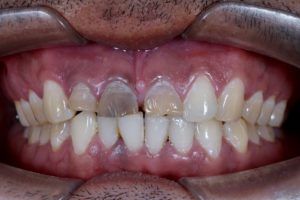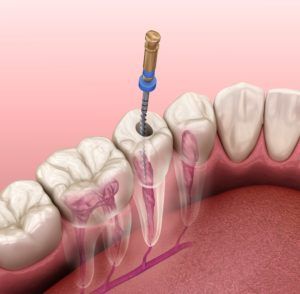Root Canals
Root canals are restorative dental procedures that are essential when bacteria has entered the pulp, or innermost, layer of the tooth. Once bacteria is inside the tooth, the only way to prevent the infection from spreading and losing the tooth is to have a root canal. During a root canal, the decayed tissue and bacteria are removed from the pulp chamber and root canals.

Did You Know?According to the American Association of Endodontists, over 41,000 root canals are performed daily, totaling approximately 15 million root canals performed per year. |
Frequently Asked Questions
Do I need a root canal?
You will need a root canal if you have a pulp infection or if the internal structures of the tooth have become damaged. While not all infections show symptoms, possible signs that you may need a root canal include:

- Tooth pain
- Prolonged sensitivity to hot and cold
- Pain while chewing and biting
- Tooth discoloration (yellow, light brown, grey, or black)
- Swelling and tenderness in the gums
- Pain in the jawbones
- Discharge from the tooth root
- A pimple on the gums
To determine if you need a root canal, schedule a consultation with your North Vancouver general dentist today.
What can I expect when receiving root canal treatment from my North Vancouver dental office?
When receiving root canal treatment from your North Vancouver dental office, you can expect to be well taken care of by our friendly staff and expert dentist. Prior to beginning your treatment, dental x-rays will be taken to determine the extent of the infection. Once a treatment plan is in place, you will be anesthetized to keep you numb and possibly sedated, if you choose.
To begin the root canal, the dentist will isolate the affected tooth using a dental dam. A tiny hole will then be drilled in the top of the tooth to access the pulp chamber. The entire root canal procedure will be performed through this tiny hole using specialized tools. Your dentist will first remove any decayed tissue from the pulp chamber and root canals. After all the tissue has been removed, the remaining space will be cleaned to ensure that no bacteria are trapped inside.
At this point, the empty pulp chamber and root canals will be filled with a rubber-like substance called gutta percha. This substance provides internal support for the tooth since it would otherwise be hollow on the inside. In some cases, a post may also be placed for additional support. Since the decay associated with a pulp infection requires the removal of a large amount of tooth enamel, a dental crown will be placed over the affected tooth for future protection.
What can I expect after receiving a root canal from my North Vancouver dental office?
After your root canal, you will likely still be numb for a few hours following your procedure. We suggest waiting until you have regained feeling before eating to avoid accidentally biting your cheeks or tongue. Once the anesthetic has worn off and in the days following, you may experience some minor pain. This is because the pulp infection causes an inflammatory response that takes a few days to resolve itself once the source of infection has been removed. In most cases, pain after a root canal can be managed by taking over the counter pain medications and temporarily avoiding hard foods.












